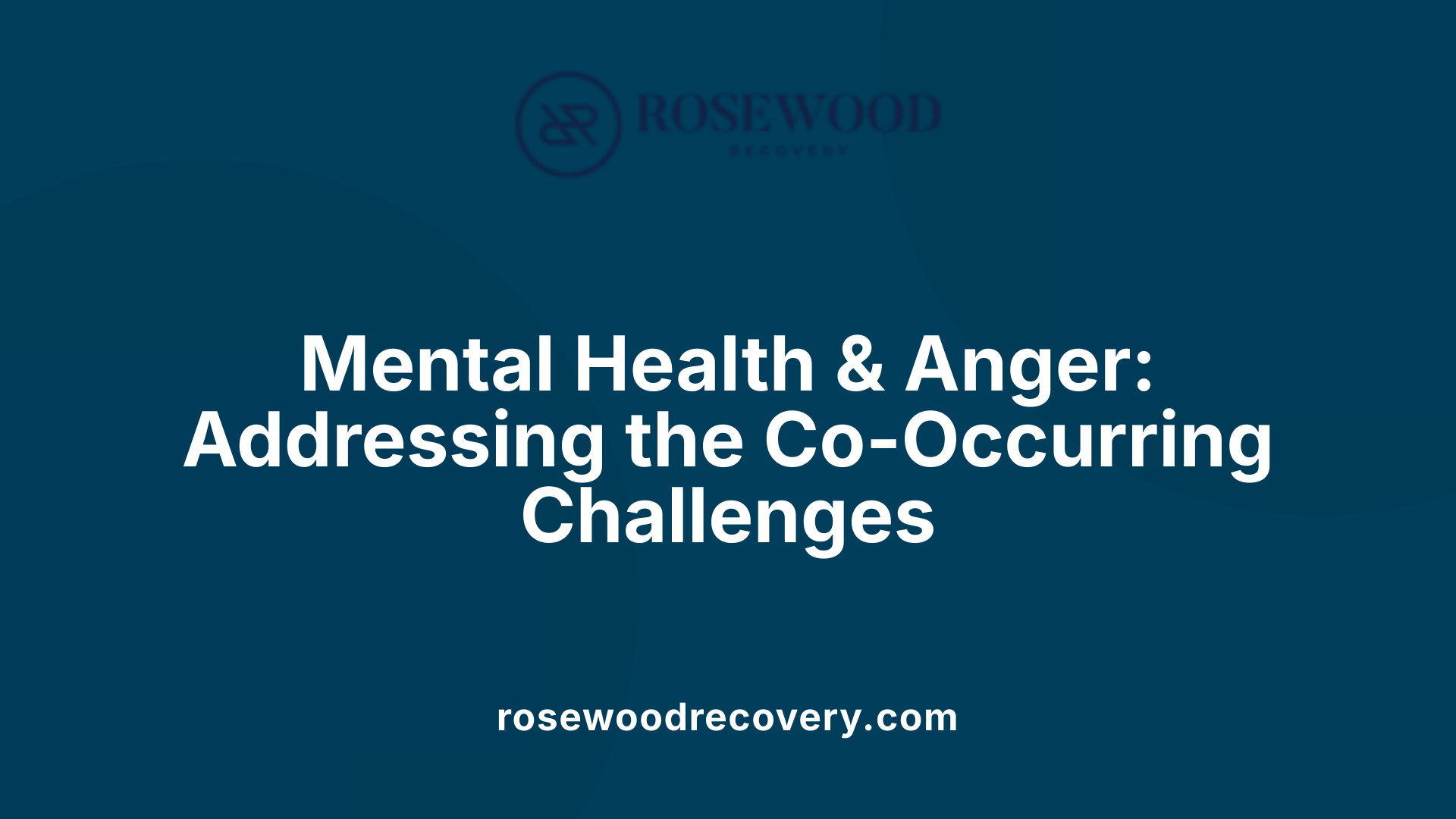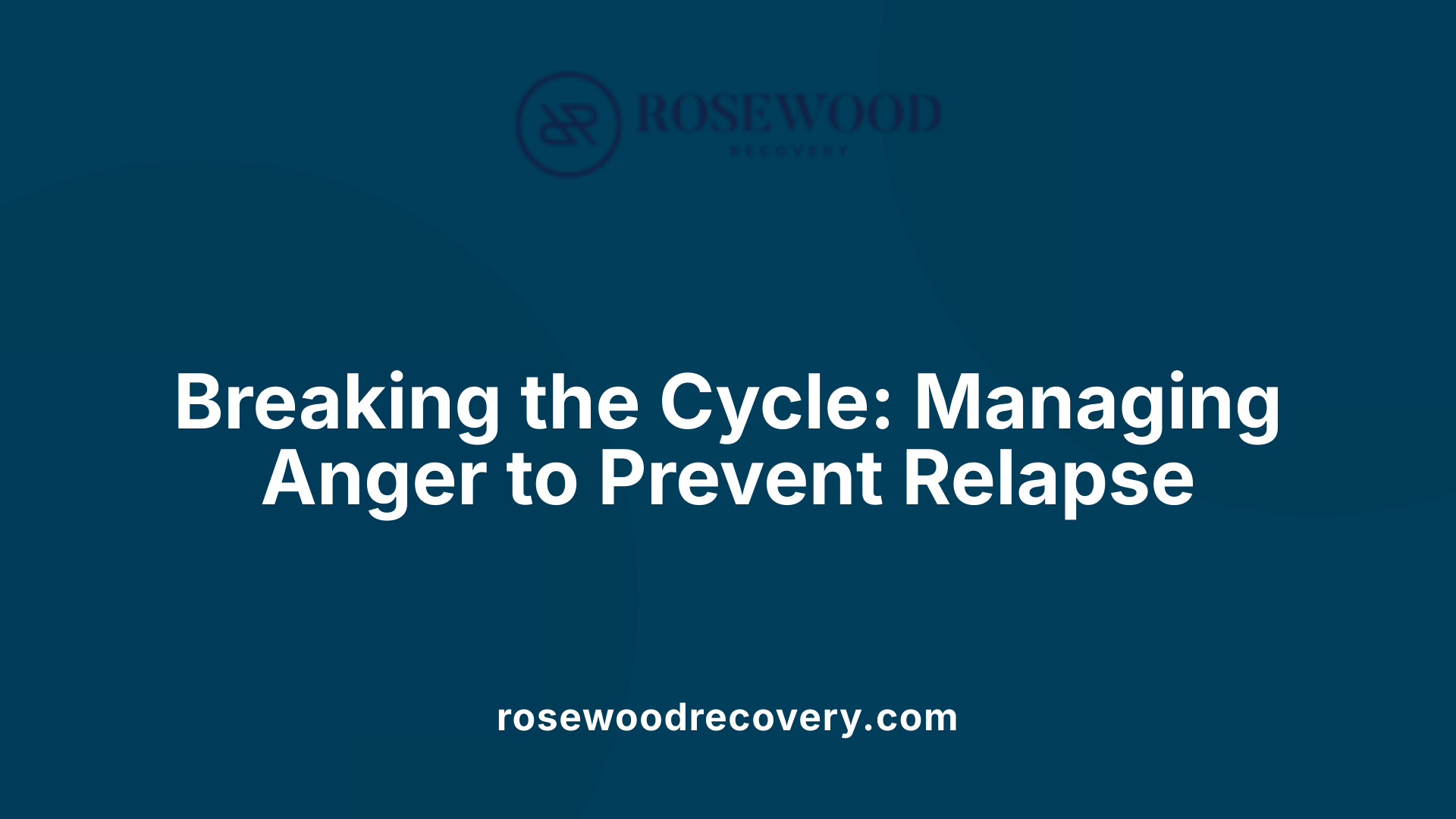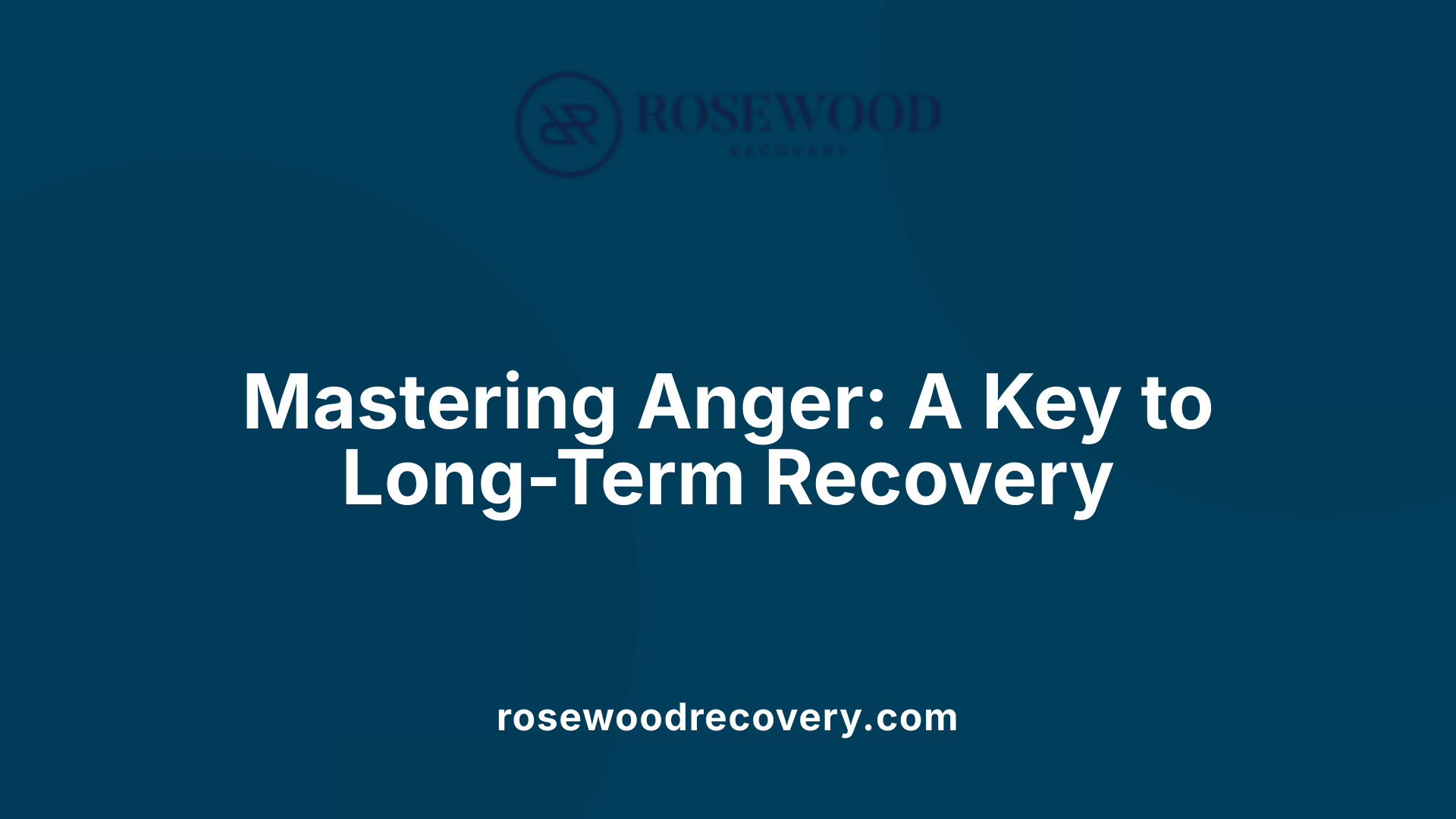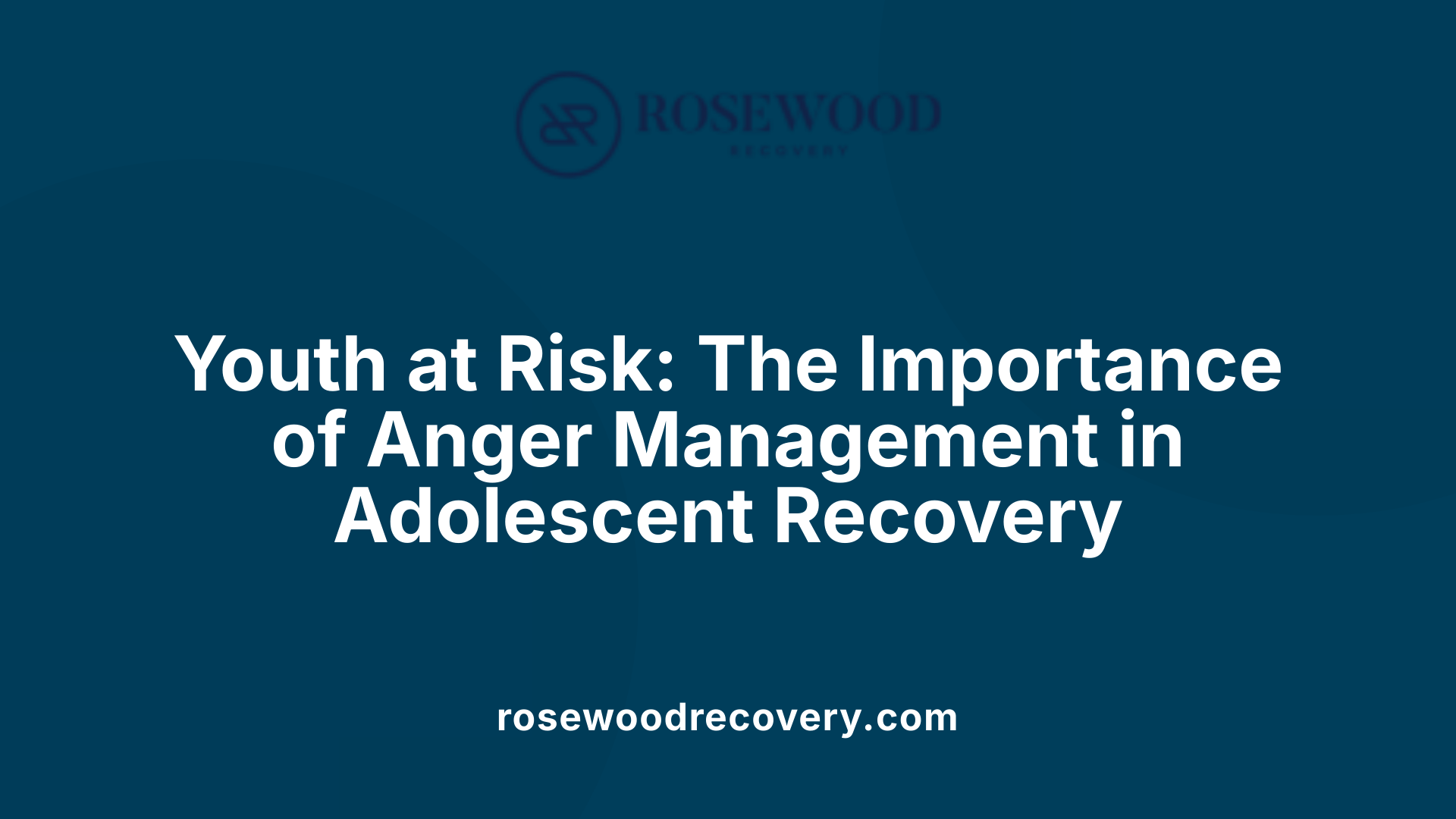Understanding the Link Between Anger and Substance Use
Anger and substance use are intricately connected in a cyclical relationship where each can amplify the other. Elevated trait anger is significantly higher in individuals using psychoactive substances compared to non-users, posing challenges for treatment and recovery. This article delves into the multifaceted relationship between anger and substance use, examining neurobiological, psychological, and social factors, as well as effective treatment approaches aimed at managing anger to improve outcomes in addiction recovery.
Elevated Trait Anger Among Substance Users: A Persistent Challenge
What is trait anger and how does it relate to substance use?
Trait anger refers to a person’s consistent tendency to experience anger as a characteristic part of their personality. Unlike temporary emotions, trait anger describes a stable predisposition to react with anger across various situations.
Research shows that individuals using psychoactive substances exhibit significantly higher levels of trait anger compared to those who do not use these substances. Quantitatively, substance users show a mean standardized difference of approximately 2.15 standard deviations higher in trait anger, highlighting a substantial disparity.
Does elevated anger in substance users depend on age or duration of abstinence?
The heightened levels of anger in substance users appear to be persistent and independent of factors such as age or the length of abstinence from substance use. This implies that elevated anger is not merely a temporary emotional state caused by recent substance consumption but rather a long-lasting trait.
This persistence suggests that even after stopping substance use, individuals may continue to experience high anger levels, which can influence their behavior and potential for relapse.
Why is the persistence of elevated anger significant in treatment?
Understanding that elevated trait anger is enduring emphasizes the importance of incorporating anger management strategies into treatment programs. Addressing this persistent anger can help reduce relapse risk and support better emotional regulation, making recovery more sustainable.
Overall, the strong link between trait anger and substance use underscores the need for continued research and focused therapeutic approaches that target both substance use behaviors and underlying emotional characteristics.
Neurobiological Factors Linking Anger and Substance Use
How do neurobiological changes contribute to anger in substance users?
Substance use profoundly alters brain function, particularly within regions responsible for emotional regulation and impulse control. One critical area affected is the orbitofrontal cortex, known for its role in decision-making and managing emotional responses. Dysfunction in this brain region leads to higher impulsivity and increased anger responses in substance users.
Alcohol consumption specifically impairs the prefrontal cortex, the brain center vital for controlling emotions and behavior. At the same time, it heightens activity in the amygdala, the region that processes emotions like fear and aggression. This combination makes individuals more emotionally reactive and prone to aggressive outbursts.
Stimulant drugs such as cocaine, methamphetamine, and amphetamines produce significant dopamine surges, inducing a state of hyperarousal. This heightened state increases impulsivity and the likelihood of violent behavior. The interplay of these neurobiological effects creates a strong foundation for anger issues in those with substance use disorders.
Overall, these changes disrupt the brain’s ability to regulate anger and impulsivity, linking substance use to heightened aggressive behaviors and emotional dysregulation. Understanding these mechanisms is crucial for tailoring effective treatments that target both emotional regulation and substance use.
The Role of Psychiatric Comorbidities in Amplifying Anger and Substance Use

How do psychiatric disorders like depression and anxiety relate to anger and substance use?
Depression and anxiety are common among people who use psychoactive substances and are consistently linked with higher levels of trait anger. These negative emotional states can exacerbate anger, which may in turn increase the risk of relapse during substance use treatment.
Approximately 32% of individuals diagnosed with mood disorders, including depression, also struggle with substance use disorders (SUD). This significant overlap suggests that psychiatric comorbidities play a critical role in both anger expression and substance use behaviors.
Depression's impact on substance misuse
Individuals experiencing depression may turn to substances to self-medicate, attempting to alleviate symptoms such as sadness or hopelessness. Interestingly, symptoms of depression often improve following cessation of alcohol or drug use, indicating a bidirectional relationship.
Different forms of depression—such as major depressive disorder and bipolar disorder—are associated with varying risks of developing SUD. For example, about 16.5% of people with major depression and a striking 56% of those with bipolar disorder have experienced a lifetime SUD.
Co-occurrence statistics of mood disorders and SUD
Mental health issues are closely linked with substance use disorders. The presence of depression and anxiety not only heightens anger levels but also complicates treatment outcomes.
Integrated treatment approaches are necessary to address these overlapping conditions effectively. These include cognitive-behavioral therapy (CBT), dialectical behavior therapy (DBT), and medications targeting both mental health symptoms and substance use challenges.
By managing psychiatric symptoms alongside substance misuse, treatment providers can help reduce anger, improve emotional regulation, and ultimately lower the risk of relapse.
Emotional Dysregulation: A Key Risk Factor for Addiction and Anger

What is emotional dysregulation and how does it relate to substance use and anger?
Emotional dysregulation refers to the difficulty individuals have in managing and modulating their emotions effectively. This inability to regulate emotions can result in exaggerated and prolonged emotional responses, particularly intense anger and depressive symptoms. People experiencing emotional dysregulation are more vulnerable to engaging in addictive behaviors as a form of coping.
Its role in addiction, depression, and anger
Emotional dysregulation plays a significant role in the development and maintenance of addiction, especially substance use disorders. It contributes to negative emotional states that individuals may attempt to alleviate through drug or alcohol use. Depression often accompanies these difficulties in emotion regulation, and the combination can create a harmful cycle: emotional distress leads to substance misuse, which worsens emotional control.
High trait anger is frequently observed in substance users and tends to be persistent, independent of factors like age or abstinence duration. This anger is linked to neurobiological changes, such as dysfunction in brain areas responsible for impulse control and emotional regulation. Additionally, psychiatric comorbidities like anxiety and depression are common and correlate with increased anger, complicating treatment efforts.
Impact on behavior and relapse risk
The meeting point of emotional dysregulation, anger, and substance use presents serious challenges for recovery. Anger can increase impulsive behaviors and elevate the risk of relapse by making it harder for individuals to manage stressors, family conflicts, and frustrations. Adolescents with high anger entering substance use treatment often have more severe psychiatric and substance problems and poorer long-term outcomes.
Therefore, addressing emotional dysregulation through integrated therapies such as cognitive-behavioral therapy (CBT) and dialectical behavior therapy (DBT) is crucial. These approaches focus on helping individuals develop emotion regulation skills, reduce negative emotional reactions, and improve impulse control, ultimately enhancing treatment success and reducing relapse.
| Aspect | Description | Implications for Treatment |
|---|---|---|
| Emotional Dysregulation | Difficulty managing emotions, leading to intense anger and depression | Need for therapies targeting emotional control |
| Relation to Addiction | Drives maladaptive coping through substance use to manage distress | Increases vulnerability and relapse risk |
| Anger and Behavior | Persistent high trait anger increases impulsivity and aggression | Anger management critical in recovery |
| Psychiatric Comorbidities | Common depression and anxiety amplify emotional dysregulation | Integrated treatment for co-occurring disorders is needed |
| Relapse Risks | Unmanaged anger and emotional dysregulation can trigger relapse | Importance of emotion regulation and coping skill training |
The Vicious Cycle: How Anger and Substance Use Reinforce Each Other

How do anger and substance use create a cyclical relationship?
Anger and substance use often fuel each other in a harmful cycle. Anger may drive people to consume drugs or alcohol as a way to manage or escape from overwhelming emotions. However, substance use can then intensify feelings of anger by triggering neurobiological changes that heighten impulsivity and emotional reactivity.
Cycle of anger leading to substance use
When individuals experience frequent anger, frustration, or unresolved emotional pain, they may turn to substances for relief. This coping strategy temporarily dulls painful feelings but does not address underlying issues, leading to repeated use and dependence.
Substance use exacerbating anger
Substance abuse affects brain areas like the orbitofrontal cortex and amygdala, disrupting emotional regulation and increasing aggression. Withdrawal periods can also trigger intense irritability and anger, sometimes lasting weeks or months, perpetuating the cycle.
Addictive nature of anger
Interestingly, anger itself can become addictive. The endorphin rush associated with feeling angry can motivate some people to seek out anger-inducing situations or substances that boost these sensations, creating another layer of dependency.
Role of trauma and unhealed psychological injuries
Trauma, such as childhood exposure to domestic violence or parental substance abuse, often results in unresolved anger. These unhealed wounds contribute to both heightened anger responses and vulnerability to substance use as a means of coping, embedding the individual in this vicious cycle.
Breaking this harmful loop requires integrated treatment focusing on emotional regulation, trauma healing, and effective anger management strategies, which can help reduce reliance on substances and restore emotional balance.
Impact of Childhood Trauma on Anger and Later Substance Use
How does childhood trauma influence anger and substance use later in life?
Children who witness domestic violence or have parents who abuse drugs often suffer from profound trauma. This early exposure disrupts their emotional development and increases the likelihood of chronic anger issues.
Such trauma can cause lasting emotional dysregulation, making it harder for these individuals to manage frustration and anger healthily. As a result, they may be more prone to relying on substances as a way to self-medicate or cope with these intense feelings.
The cycle of trauma and substance use often perpetuates itself. Childhood trauma increases the risk of anger-related problems, which in turn raises susceptibility to substance abuse. This relationship lays a foundation for heightened emotional challenges and addiction vulnerability in later life.
Intervention strategies focusing on trauma-informed care and anger management from an early stage are critical. Addressing these issues can reduce long-term risks and improve emotional regulation, thereby helping prevent substance abuse driven by untreated childhood trauma.
Substances, Withdrawal, and Their Effects on Anger and Aggression
How do different substances and withdrawal states affect anger and aggression?
Withdrawal from stimulants such as cocaine, methamphetamine, and opioids is commonly linked to increased anger and aggressive behaviors. This heightened irritability can last for weeks or even months following cessation, making the early recovery period particularly challenging.
Alcohol consumption notably interferes with brain function by impairing the prefrontal cortex—responsible for decision-making and emotional regulation. This impairment, along with increased activity in the amygdala, intensifies emotional reactivity and can result in heightened aggression.
Stimulants produce significant dopamine surges that create states of hyperarousal and impulsivity, both of which are strongly connected to violent behavior. The intense stimulation on brain systems disrupts normal emotional responses and lowers the threshold for aggressive acts.
Synthetic cannabinoids like "Spice" or "K2" bring unpredictable mood swings, paranoia, hallucinations, delusions, and aggressive behavior due to their potent and erratic effects on brain chemistry.
Furthermore, mixing substances such as alcohol with stimulants or benzodiazepines amplifies irritability and impulsiveness, significantly increasing the risk of violent and aggressive responses.
Effective treatment requires detoxification, psychotherapy including cognitive-behavioral therapy (CBT), anger management strategies, and addressing co-occurring mental health issues. This comprehensive approach helps manage anger and aggression during both active use and the withdrawal period, reducing the risk of relapse and improving long-term outcomes.
The Importance of Anger Management in Substance Abuse Treatment

Why is managing anger critical in substance abuse treatment?
Managing anger is a vital component of successful substance abuse treatment. Individuals struggling with substance use often exhibit significantly higher trait anger, which can elevate the risk of relapse if not properly addressed. Anger management therapy assists clients by helping them identify triggers and recognize patterns in their emotional reactions, enabling them to gain better control over impulsive and aggressive behaviors.
Role of anger management therapy
Anger management therapy integrates various techniques designed to reduce angry outbursts and teach healthier coping strategies. Through therapy, clients learn to navigate daily stressors, family conflicts, and frustrations more effectively, which are common contributors to heightened anger. Addressing these emotional challenges helps to break the cycle where anger leads to substance use and substance use exacerbates anger.
CBT, mindfulness, and relaxation techniques
Cognitive-behavioral therapy (CBT) plays a central role by focusing on reframing negative thought patterns that fuel anger. Mindfulness practices encourage present-moment awareness, which aids in recognizing and slowing down emotional responses. Relaxation exercises, including deep breathing and meditation, reduce physiological arousal associated with anger, enhancing emotional regulation.
Reducing relapse risk and improving emotional control
By adopting these anger management strategies, individuals can decrease impulsivity and aggression, which are common relapse triggers. Therapy fosters skills like assertive communication and conflict resolution, crucial for long-term recovery stability. Ultimately, managing anger effectively supports emotional balance, making sustained sobriety more attainable and improving overall treatment outcomes.
Integrated Treatment Approaches for Co-occurring Disorders
What are comprehensive treatment services for substance abuse and mental health issues?
Comprehensive treatment services for individuals facing both substance use and mental health disorders involve a multifaceted approach. These services focus on addressing the complexity of co-occurring disorders through medically supervised detoxification, counseling, behavioral therapies, and medication management.
CBT and DBT therapies
Cognitive-Behavioral Therapy (CBT) and Dialectical Behavior Therapy (DBT) are core behavioral interventions used in integrated treatments. CBT helps clients recognize and change negative thought patterns and behaviors linked to both addiction and emotional dysregulation, including anger management. DBT, originally developed for borderline personality disorder, emphasizes skills in emotion regulation, distress tolerance, and interpersonal effectiveness, making it especially useful for patients struggling with intense emotions like anger and impulsivity that can trigger relapse.
Medication management
Medication-assisted treatments play an essential role by addressing neurochemical imbalances and managing psychiatric symptoms concurrently with substance use disorders. Medications may target depression, anxiety, or mood stabilization, which can reduce the emotional triggers—such as irritability and anger—that often exacerbate substance misuse. Careful monitoring ensures appropriate use and mitigates adverse interactions or withdrawal-related irritability.
Addressing mental health and addiction simultaneously
Integrated treatment models prioritize the simultaneous and coordinated care of mental health and substance use disorders. This approach acknowledges the interplay between psychiatric conditions (e.g., depression, bipolar disorder, anxiety) and substance misuse, focusing on trauma-informed care and psychoeducation. Behavioral strategies to enhance emotion regulation and coping skills, combined with psychotherapy and pharmacological support, create more sustainable recovery pathways.
By combining these methods, integrated treatment addresses the full spectrum of client needs, reduces angry outbursts, improves emotional stability, and decreases the risk of relapse. This holistic approach is particularly important given that unresolved anger and emotional dysregulation significantly hinder recovery outcomes in individuals with co-occurring disorders.
Managing Daily Stressors and Family Conflicts to Reduce Anger
How do daily stressors and family conflicts impact anger in people with substance use disorders?
Daily stressors and family conflicts significantly elevate anger levels in individuals with substance use disorders. These external pressures increase emotional intensity, making it challenging for affected individuals to regulate their anger and contributing to relapse risks. Frustrations stemming from unresolved family issues or everyday hassles add cumulative stress that undermines recovery efforts.
Strategies to mitigate daily frustrations
Effective treatment programs incorporate approaches to help clients manage these stressors. Techniques include developing healthy communication skills to address family conflicts, practicing assertive behavior to set boundaries, and using relaxation methods such as meditation or journaling to reduce emotional tension. Engaging in positive distractions like creative hobbies or exercise also provides constructive outlets for managing frustration.
Improving treatment outcomes by addressing these factors
By focusing on daily stress and family dynamics, treatment outcomes improve through enhanced emotional regulation and reduced anger-driven relapse. Tailored anger management therapies teach coping strategies that empower clients to navigate daily challenges without resorting to substance use. This holistic approach fosters resilience and supports long-term recovery success.
Healthy Anger Management Techniques to Support Recovery
What are effective healthy methods to manage anger in recovery?
Managing anger effectively is a crucial part of maintaining long-term recovery from substance use disorders. Several healthy techniques help individuals control their anger, reducing the risk of relapse and improving emotional well-being.
Journaling allows individuals to express and reflect on their feelings privately, which can help release built-up frustration and identify anger triggers. Meditation and relaxation practices promote mindfulness and calm, helping to reduce immediate angry reactions.
Assertive communication encourages expressing feelings clearly and respectfully, which improves interpersonal relationships and decreases conflicts that might provoke anger. Humor and creative hobbies provide positive distractions, channeling energy into enjoyable activities that boost mood and reduce tension.
Physical exercise is especially effective; it releases endorphins that improve mood and decrease irritability. Consistent engagement in activities like walking, running, or yoga can foster emotional regulation.
Overall, building positive coping skills such as the techniques mentioned supports healthier emotional responses, helping individuals stay focused on recovery and avoid impulsive behaviors linked with anger and substance use.
Adolescent Substance Use Treatment: The Critical Role of Anger Assessment

Why is anger assessment important in adolescent substance use treatment?
Adolescents entering substance use treatment who display high levels of anger often face more severe challenges. Research highlights that these youths not only use substances more heavily but also experience substantial psychiatric complications. Common comorbid disorders include ADHD, Conduct Disorder, and Depressive Disorder, which intensify the difficulty of treatment and recovery.
High anger linked with worse outcomes in youth
High anger in adolescents correlates strongly with poor long-term results in treatment programs. These youths exhibit increased rates of relapse into substance use, episodes of delirium tremens, and behavioral issues such as temper outbursts and physical altercations, sometimes leading to legal troubles. Such outcomes underscore anger's pervasive impact on recovery trajectories.
Association with psychiatric disorders
The interplay between anger and psychiatric disorders in these adolescents presents a complex clinical picture. Anger often exacerbates symptoms of underlying mental health conditions, making management more difficult. The co-occurrence of these conditions with substance use disorder calls for comprehensive approaches that address emotional regulation alongside substance abuse.
Incorporating anger management for improved engagement
Integrating anger assessment and management into treatment plans can greatly benefit adolescent patients. Therapeutic interventions focusing on anger control can improve treatment engagement, reduce relapse risk, and promote healthier coping mechanisms. Techniques such as cognitive-behavioral therapy, mindfulness, and relaxation exercises are effective in helping young patients regulate emotions and navigate the challenges of recovery.
Focusing on anger as a pivotal factor for adolescents in substance use treatment improves the likelihood of sustained recovery and better mental health outcomes. This integrated approach helps tackle both the emotional and behavioral dimensions contributing to substance use complications in youth.
Addressing Anger: A Critical Component in Substance Use Recovery
Anger is deeply intertwined with substance use through neurobiological, psychological, and social pathways, often creating a self-perpetuating cycle that challenges recovery efforts. Elevated trait anger, emotional dysregulation, trauma, and co-occurring psychiatric conditions compound these difficulties. Comprehensive treatment approaches that integrate anger management, behavioral therapies, and support systems are essential to breaking this cycle. Effective anger regulation not only reduces relapse risk but also fosters healthier emotional wellbeing, paving the way for sustained recovery and improved quality of life.
References
- Anger and substance abuse: a systematic review and meta ...
- The Role of Emotions in Recovery and Treatment
- Addiction and Anger Management
- Connection Between Anger Management and SUD
- The Link Between Substance Use and Anger
- Anger and its Association with Substance Use Treatment ...
- Find treatment for substance use | Behavioral Health Services
- Chapter 5—Specialized Substance Abuse Treatment Programs
- Mental health & substance use disorders




